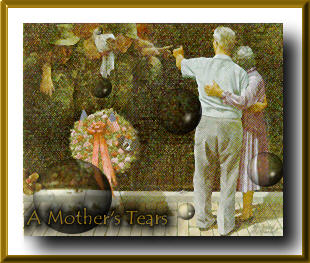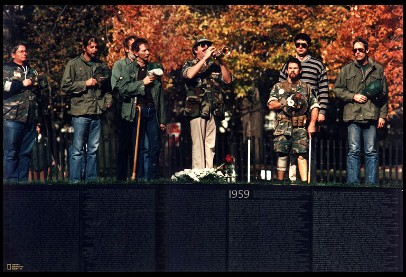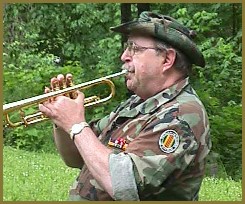![]()

Doc's Patriotic Graphics
![]()
These men from Eugene,/ Springfield
Oregon
Are Honored here.
Their names are listed on the Vietnam Memorial Wall
So that you may be Free.
 |
Adrian Vaaler- Vietnam Veteran-'The Bugler'
Of Eugene, Oregon
Washington, D.C. National Memorial Dedication Vietnam Wall
[ 1985 National Geographic photo © ]
![]()
STRATHER FRANKLIN WOOD
Marine Corps - 1LT - O2
Age - 26
Date of Birth - Apr 26, 1944
Army - PFC - E3
1st Cav Division (AMBL)
From - EUGENE , OREGON
SELWIN DEROY WISDOM
Army - LTC - O4
Age - 43
Date of Birth - Sep 01, 1922
From - EUGENE , OREGON
MICHAEL LANCE WILSON
Marine Corps - PFC - E2
Age - 18
Date of Birth - Oct 15, 1949
From - EUGENE , OREGON
JOHN CLARK WHEELER
Army - PFC - E3
1st Cav Division (AMBL)
Age - 21
Date of Birth - Mar 06, 1947
From - EUGENE , OREGON
KREG ARTHUR VIESTENZ
Army - PFC - E3
1st Cav Division (AMBL)
Age - 19
Date of Birth - Mar 09, 1949
From - EUGENE , OREGON
EDWIN NEWTON TROXEL
Air Force - MAJ - O4
Age - 41
Date of Birth - Dec 29, 1929
From - EUGENE , OREGON
DAVID TORRES
Marine Corps - LCPL - E3
Age - 20
Date of Birth - Jan 28, 1949
From - EUGENE , OREGON
EDWARD HAROLD STUART
Army - PFC - E3
11th Light Infantry Brigade
Age - 21
Date of Birth - Jan 22, 1947
From - EUGENE , OREGON
ROBERT S SHRIVER JR
Army - SP4 - E4
1st Cav Division (AMBL)
Age - 20
Date of Birth - Oct 09, 1945
From - EUGENE , OREGON
JOHN DAVID MUSGROVE
Air Force - CAPT - O3
Age - 37
Date of Birth - Mar 24, 1928
From - EUGENE , OREGON
PATRICK EDWARD MURPHY
Marine Corps - PFC - E2
Age - 20
Date of Birth - Jan 27, 1949
From - EUGENE , OREGON
WILLIAM GUY MUIR
Army - PFC - E3
4th Infantry Division
Age - 22
Date of Birth - Dec 30, 1944
From - EUGENE , OREGON
DENNIS ERWIN MICKELSON
Marine Corps - LCPL - E3
Age - 19
Date of Birth - Dec 07, 1949
From - EUGENE , OREGON
RANDALL PAUL MANELA
Marine Corps - CPL - E4
Age - 19
Date of Birth - May 14, 1951
From - EUGENE , OREGON
DAVID WILLIAM LOEW
Army - SP4 - E4
196th Light Infantry Brigade
Age - 21
Date of Birth - Apr 27, 1948
From - EUGENE , OREGON
PETER CLARK LITTLE
Army - 1LT - O2
Age - 23
Date of Birth - Aug 30, 1945
From - EUGENE , OREGON
DONALD FREDRICK LINDLAND
Navy - CDR - O5
Age - 41
Date of Birth - Aug 22, 1936
From - EUGENE , OREGON
LAWRENCE DONALD LARSON
Marine Corps - LCPL - E3
Age - 18
Date of Birth - Nov 18, 1950
From - EUGENE , OREGON
KENNETH MARTIN KREBS
Marine Corps - LCPL - E3
Age - 19
Date of Birth - Feb 21, 1949
From - EUGENE , OREGON
ROBERT LLOYD KLEINSMITH
Marine Corps - PFC - E2
Age - 20
Date of Birth - Sep 09, 1948
From - EUGENE , OREGON
DAVID ALLEN JOHNSON
Army - SP4 - E4
25th Infantry Division
Age - 22
Date of Birth - Oct 08, 1946
From - EUGENE , OREGON
NORMAN A JENSEN
Army - SGT - E4
11th Light Infantry Brigade
Age - 20
Date of Birth - Feb 07, 1949
From - EUGENE , OREGON
RONALD ARTHUR HEINTZ
Navy - EN2 - E5
Age - 25
Date of Birth - Jan 24, 1941
From - EUGENE , OREGON
ROBERT HOMER HARDENBROOK
Army - SSGT - E6
1st Cav Division (AMBL)
Age - 32
Date of Birth - Apr 09, 1935
From - EUGENE , OREGON
CARLTON COE GRAY
Army - SGT - E4
101st Airborne Division
Age - 19
Date of Birth - May 20, 1950
From - EUGENE , OREGON
JAMES ROLAND GOLZ
Marine Corps - PFC - E2
Age - 18
Date of Birth - Mar 12, 1949
From - EUGENE , OREGON
BRUCE JAMES FLETCHER
Marine Corps - PFC - E2
Age - 18
Date of Birth - Feb 06, 1949
From - EUGENE , OREGON
THOMAS HOYT FARMER
Army - SP4 - E4
5th Infantry Division Mechanized
Age - 20
Date of Birth - Aug 12, 1950
From - EUGENE , OREGON
ARTHUR ALBERT ERWIN
Army - SP4 - E4
173rd Airborne Brigade
Age - 19
Date of Birth - Jul 24, 1947
From - EUGENE , OREGON
ROBERT KNAPP COLLINS
Marine Corps - CPL - E4
Age - 21
Date of Birth - May 24, 1944
From - EUGENE , OREGON
FRANCIS WARREN CODY
Army - SP4 - E4
11th Light Infantry Brigade
Age - 20
Date of Birth - Oct 31, 1948
From - EUGENE , OREGON
SCOTT EDWARD COCHRAN
Army - CPL - E3
1st Cav Division (AMBL)
Age - 18
Date of Birth - Jul 05, 1950
From - EUGENE , OREGON
RONALD JOSEPH CARTWRIGHT
Army - PFC - E3
1st Cav Division (AMBL)
Age - 24
Date of Birth - Apr 15, 1943
From - EUGENE , OREGON
JAMES WARREN CARTWRIGHT
Army - SGT - E5
4th Infantry Division
Age - 22
Date of Birth - Jul 07, 1944
From - EUGENE , OREGON
DAVID BERNARD BEGLAU
Army - SGT - E4
101st Airborne Division
Age - 21
Date of Birth - Nov 20, 1949
From - EUGENE , OREGON
WILLIAM ARNOLD BECKWITH
Marine Corps - LCPL - E3
Age - 22
Date of Birth - Feb 16, 1946
From - EUGENE , OREGON
MELVIN LYNN APPLEBURY
Army - SP4 - E4
4th Infantry Division
Age - 20
Date of Birth - Aug 12, 1948
From - EUGENE , OREGON
WILLIAM RICHARD ANDREWS
Air Force - LTC - O5
Age - 37
Date of Birth - Jun 09, 1937
From - EUGENE , OREGON

MICHAEL RAY WEBB
Marine Corps - LCPL - E3
Age - 19
Date of Birth - Sep 28, 1946
From - SPRINGFIELD , OREGON
JACK CLINTON TAYLOR
Army - CPL - E3
9th Infantry Division
Age - 20
Date of Birth - Sep 09, 1947
From - SPRINGFIELD , OREGON
FRED JASON SECRIST
Army - SP4 - E4
Age - 19
Date of Birth - Oct 02, 1948
From - SPRINGFIELD , OREGON
DAVID LYLE ROSS
Marine Corps - PFC - E2
Age - 18
Date of Birth - Jan 27, 1950
From - SPRINGFIELD , OREGON
JESSE ANDREW PYLE
Army - SP5 - E5
MACV Advisors
Age - 35
Date of Birth - Nov 09, 1929
From - SPRINGFIELD , OREGON
TIMOTHY ROBERT OWNBEY
Army - SP4 - E4
11th Armored Cavalry
Age - 20
Date of Birth - May 06, 1950
From - SPRINGFIELD , OREGON
BOBBIE JOE MOUNTS
Army - PVT - E2
Age - 23
Date of Birth - Apr 18, 1944
From - SPRINGFIELD , OREGON
RONALD HAROLD JOHNSON
Navy - SN - E3
Age - 21
Date of Birth - Oct 30, 1945
From - SPRINGFIELD , OREGON
JAMES MELVIN GHEER
Army - SP5 - E5
1st AVN BDE
Age - 20
Date of Birth - Oct 10, 1948
From - SPRINGFIELD , OREGON
TERRY LEE CRAWFORD
Army - WO - W1
Age - 20
Date of Birth - May 03, 1948
From - SPRINGFIELD , OREGON
JAMES WALTER CLEMENTS
Marine Corps - PFC - E2
Age - 20
Date of Birth - Dec 01, 1946
From - SPRINGFIELD , OREGON
 |
![]()



Adrian Vaaler- Vietnam Veteran-
Lone Bugler
Play those notes so load and clear, of battles of the past
When young men gave their lives for us, the memories will last
So play the tune of forlorn note, let us hear the bugle cry
Stand proud my Brother of Vietnam
Along side you …am I
Let none forget the sacrifice, of so many across the years
Let none that hear the bugle sing
Continue without a tear
And on this Memorial Day to remember
May your notes so haunting be
That never again will young men die
Or live to remember
As We.
May 27th, 2000
Dave Jones /11Bravovet
![]()
A Soldier’s Memorial
What did you see when you arose today and looked against the sky?
To where it touches the crest of the earth to a sunrise that makes you cry
For here today is the memory of young men who fought many wars
Grandfathers and sons, fathers and uncles, daughters and so many more.
From Civil War battles to oceans afar, Korea, Vietnam and Iraq
To little known places lost corners of earth,
some say they never came back
But please watch the sunrise, each colored sunset,
you’ll see on the crest of the rise
You’ll hear Taps that’s playing and young soldiers again
That cherished us so with their lives.
I sincerely believe they’re with us still now
still in step with the freedom we share
And they march to the stillness of mornings and evenings
And sharply salute those that care.
And when you look deeply at the places they rest
Arlington, Pearl Harbor and stone
You’ll notice the crosses, marble and granite
But each soldier’s spirit is Home.
Take just a moment and rise with the sun,
take another to watch it descend
And listen in silence to the bugle play Taps
Beyond the hills stands your friend.
Memorial Day 2004, 11Bravovet
![]()
TAPS
The 132-year-old bugle call was composed by Brig. Gen. Daniel Butterfield, who commanded the 3rd Brigade, 1st Division, V Army Corps, Army of the Potomac, during the American Civil War. Butterfield wrote "Taps" at Harrison's Landing, Va., in July 1862 to replace the customary firing of three rifle volleys at the end of burials during battle. "Taps" also replaced "Tatoo," the French bugle call to signal "lights out." Butterfield's bugler, Oliver W. Norton of Chicago, was the first to sound the new call. Within months, "Taps" was sounded by buglers in both Union and Confederate forces. One of the final bugle calls of the day on military installations, "Taps" is played at 10 p.m. as a signal to service members that it is "lights out." When "Taps" is played, it is customary to salute, if in uniform, or place your hand over your heart if not. The composer of "Taps" was born Oct. 31, 1831, in Utica, N.Y., and joined the Army in Washington, D.C. He was awarded the Medal of Honor in the U.S. Volunteers on June 27, 1862. After his brigade lost more than 600 men in the Battle of Gaines Mill, Butterfield took up the colors of the 83rd Pennsylvania Volunteers. Under heavy enemy fire, he encouraged the depleted ranks to regroup and continue the battle. Butterfield died July 17, 1901, and was buried at the U.S. Military Academy at West Point, N.Y. "Taps" was sounded at his funeral.
![]()
Email me

View My Guestbook
Sign My Guestbook
11bravovet's Home ~Updates ~Poems of Vietnam ~Pow/Mia ~Favorite Links ~Poems of Family ~A Marine's Story ~Poems of Thought ~Poems of the Heart ~Poems of Nature ~A Mothers Son ~Words of Healing ~Roy's Place ~Music ~Miscellaneous Writings ~Letters ~Awards & Gifts
Page is hosted by  Get your own
Get your own
Free Home Page